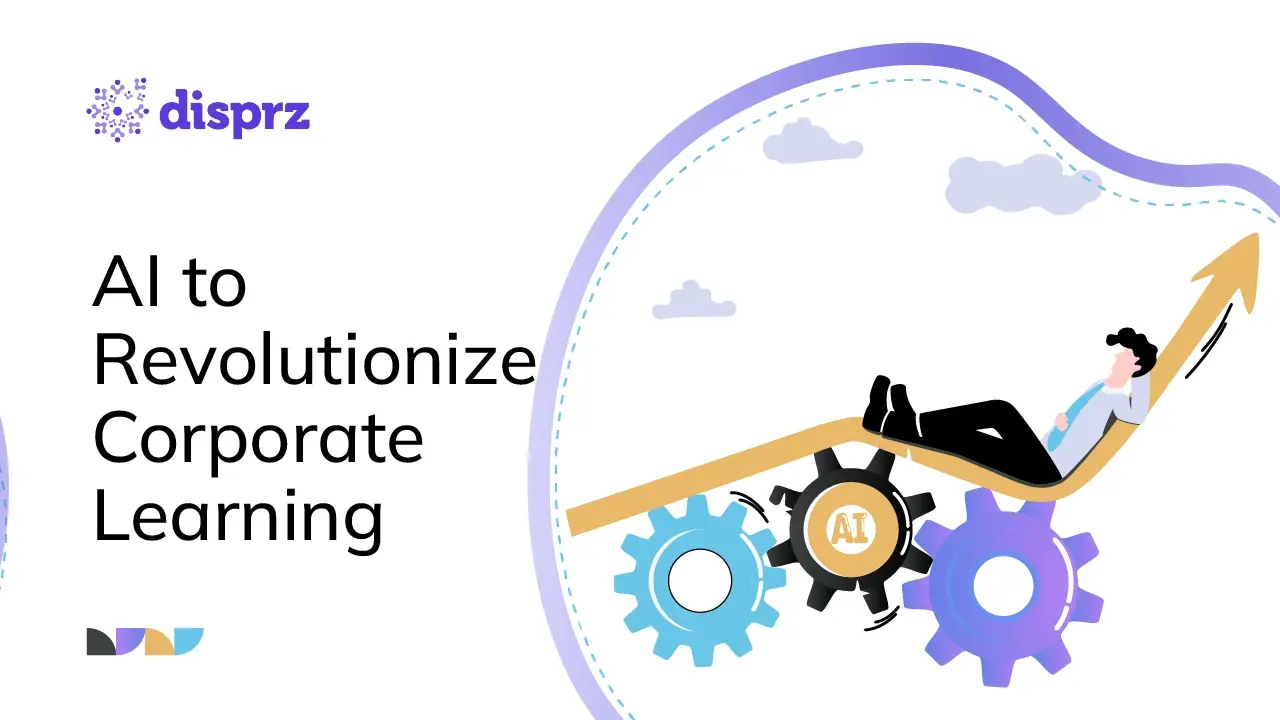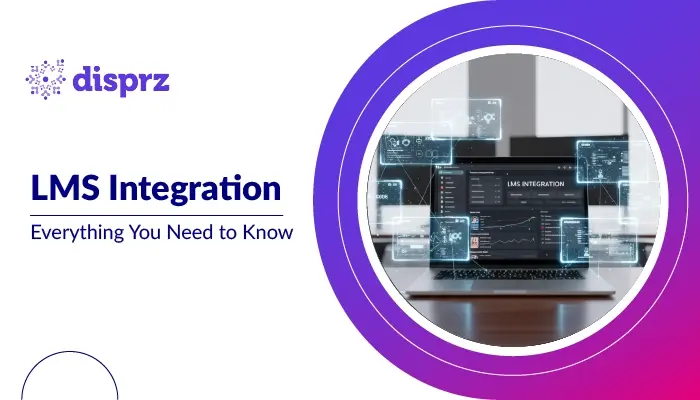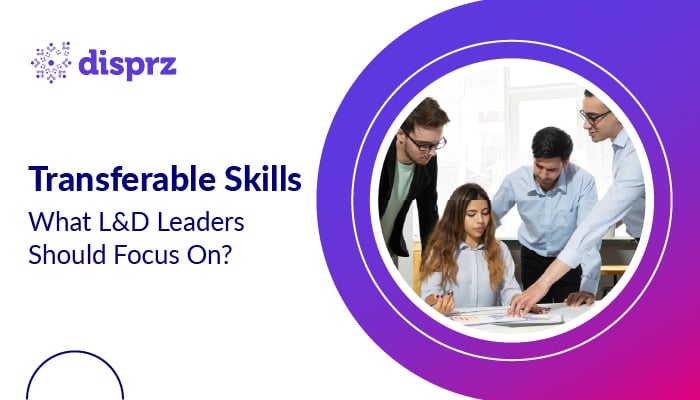Introduction to the role of AI in corporate learning
Artificial Intelligence (AI) has become a transformative force in nearly every industry, including corporate learning and Learning and Development (L&D). It has revolutionized corporate training by enabling employees to learn more quickly and efficiently.
Picture a scenario where corporate training programs proactively anticipate your needs and adjust in real time to enhance your learning experience; this is now achievable with AI in corporate learning solutions.
AI supports instructional designers in crafting engaging, learner-focused content and aids trainers in delivering more adaptive and personalized learning experiences. Its impact is pervasive, reshaping how we approach and implement training across organizations.
Benefits of AI in L&D
Below we explore the numerous benefits of artificial intelligence in L&D:
Personalized Learning
AI enables trainers to design customized learning paths tailored to each employee's unique needs, preferences, and learning styles. It provides training managers with valuable data insights, including performance metrics, learning history, and skill gaps, allowing for more targeted and effective learning strategies.
Data and Learning Analytics
AI can gather and analyze data on learner performance, providing trainers with insights into learning patterns. These insights enable trainers to enhance the effectiveness of training programs by making data-driven improvements.
Continuous Learning
AI promotes continuous learning by offering employees immediate access to personalized resources and information. This on-demand access encourages ongoing development, facilitates just-in-time learning, and helps employees stay up-to-date with industry trends and best practices, boosting both their performance and productivity.
Efficiency
Automating administrative tasks like scheduling, monitoring progress, and evaluating performance enables trainers to concentrate on the strategic elements of training. This increased efficiency enhances overall effectiveness and helps maximize the return on investment (ROI) for training programs.
Cost Effectiveness
AI can substantially cut the expenses tied to traditional training approaches by automating multiple facets of the training process and providing scalable solutions.
Challenges in incorporating AI in corporate training
Lack of Personalized Learning
Each learner has distinct preferences, making it challenging for L&D teams to meet diverse needs, especially with the growing demand for training and the pressure to deliver courses quickly. Assessing individual learning styles and designing tailored programs for different learner groups can be difficult. As a result, training effectiveness may decline due to reduced learner engagement and participation.
Dull and Repetitive Course Material
Businesses are constantly evolving, and to keep pace with rapid changes, organizations are seeking innovative approaches. Developing skills is now crucial for staying aligned with industry demands. At the heart of any training program lies its content. However, under the pressure to launch training initiatives swiftly, it becomes challenging to produce distinct content for each course.
Ineffective LMS Management
Exceptional courses are pointless without a reliable LMS. Investing in a solid LMS ensures smooth management and easy access to your courses. LMS administrators are key to a seamless learning experience they manage course uploads, remove outdated content, archive old versions, and analyze performance reports to guide L&D teams on course effectiveness.
How AI helps in identifying and bridging the skill gaps
AI plays a crucial role in identifying and bridging skill gaps within organizations by offering several key advantages:
Data-Driven Insights
AI analyzes vast amounts of employee data, including performance metrics, skills assessments, and job requirements. This analysis helps pinpoint specific skill gaps at both individual and organizational levels.
Personalized Learning Paths
AI can recommend tailored training programs based on the identified skill gaps. It creates customized learning paths that address the unique needs of each employee, ensuring targeted and effective skill development.
Predictive Analytics
AI predicts future skill requirements based on industry trends and organizational goals. This foresight enables proactive skill development, preparing employees for upcoming challenges and roles.
Adaptive Learning
AI-powered systems adjust learning content in real time according to employee progress and performance. This adaptive approach ensures that training is relevant and effective, addressing skill gaps as they arise.
Skill Mapping
AI maps existing skills against job requirements and career paths, helping employees and employers understand how current skills align with future opportunities and where gaps need to be filled.
How AI is shaping the new age of eLearning
AI in digital learning is revolutionizing by making learning more personalized, accessible, and efficient. Here are some key ways it's shaping the new age of eLearning:
Personalized Learning Paths
AI analyzes a learner's behavior, progress, and preferences to create tailored learning experiences. Based on the learner's needs, AI can recommend relevant resources, adjust course difficulty, and suggest topics for improvement. This individualized approach maximizes engagement and retention.
Automated Assessments and Feedback
AI-driven systems can automatically grade assignments, quizzes, and even essays, providing instant feedback to learners. This reduces the time instructors spend on grading while offering immediate insights to students, helping them identify areas of weakness and improve faster.
AI-Powered Tutoring and Support
Intelligent tutoring systems (ITS) use AI to provide on-demand, real-time support. These systems simulate one-on-one tutoring by answering questions, explaining difficult concepts, and offering additional practice, mimicking the behavior of a human tutor.
Adaptive Learning Systems
AI helps create adaptive learning platforms that modify content delivery based on a learner’s performance. For example, if a student struggles with a specific concept, the system will provide additional resources or simpler explanations. This dynamic adjustment ensures a more efficient and effective learning process.
Learning Analytics for Improved Outcomes
AI can track vast amounts of data related to learner progress, behaviors, and outcomes. These learning analytics offer trainers insights into student engagement, performance trends, and potential drop-out risks. AI helps trainers make data-driven decisions to improve content and teaching strategies.
Natural Language Processing (NLP) in learning
With the power of NLP, AI can facilitate language learning, provide content translation, and offer voice-to-text functionalities. AI chatbots using NLP can answer learner queries 24/7, enhancing student support and reducing administrative load for trainers.
Virtual Classrooms and Collaboration Tools
AI is enhancing the experience of virtual classrooms by providing smart collaboration tools, facilitating interactive discussions, and ensuring real-time feedback. AI-driven platforms also offer analytics on student participation, helping trainers foster a more engaging learning environment.
Skill Gap Analysis and Workforce Training
AI can identify skill gaps within an individual or an organization, suggesting specific courses or training programs to address these gaps. In corporate training, AI helps design personalized learning paths to reskill or upskill employees in alignment with business goals.
Gamification and Engagement Tools
AI enhances gamified learning experiences by making the content more interactive and adapting difficulty levels based on user performance. This approach increases learner engagement, motivation, and completion rates.
Accessibility and Inclusivity
AI-driven tools can improve accessibility for learners with disabilities. For instance, AI can create transcripts, offer voice assistance, or adjust visual elements to meet diverse learner needs, making eLearning more inclusive.
Lifelong Learning and Microlearning
AI promotes a culture of continuous learning by facilitating microlearning of small, focused learning units that can be consumed on demand. This approach is ideal for learners looking to acquire skills quickly, making eLearning more agile and responsive to changing needs.
Conclusion
AI is transforming corporate training by enabling personalized learning, providing data-driven insights, and offering continuous development opportunities. AI in online learning enhances efficiency, reduces costs, and plays a critical role in identifying and addressing skill gaps within organizations. Additionally, AI for upskilling ensures that employees receive targeted training to develop the skills needed for future roles. However, challenges like managing LMS and keeping course content engaging remain.
Ready to see how AI can elevate your learning and development programs? Book a demo with Disprz today to explore our AI-powered solutions for driving employee growth and performance.








